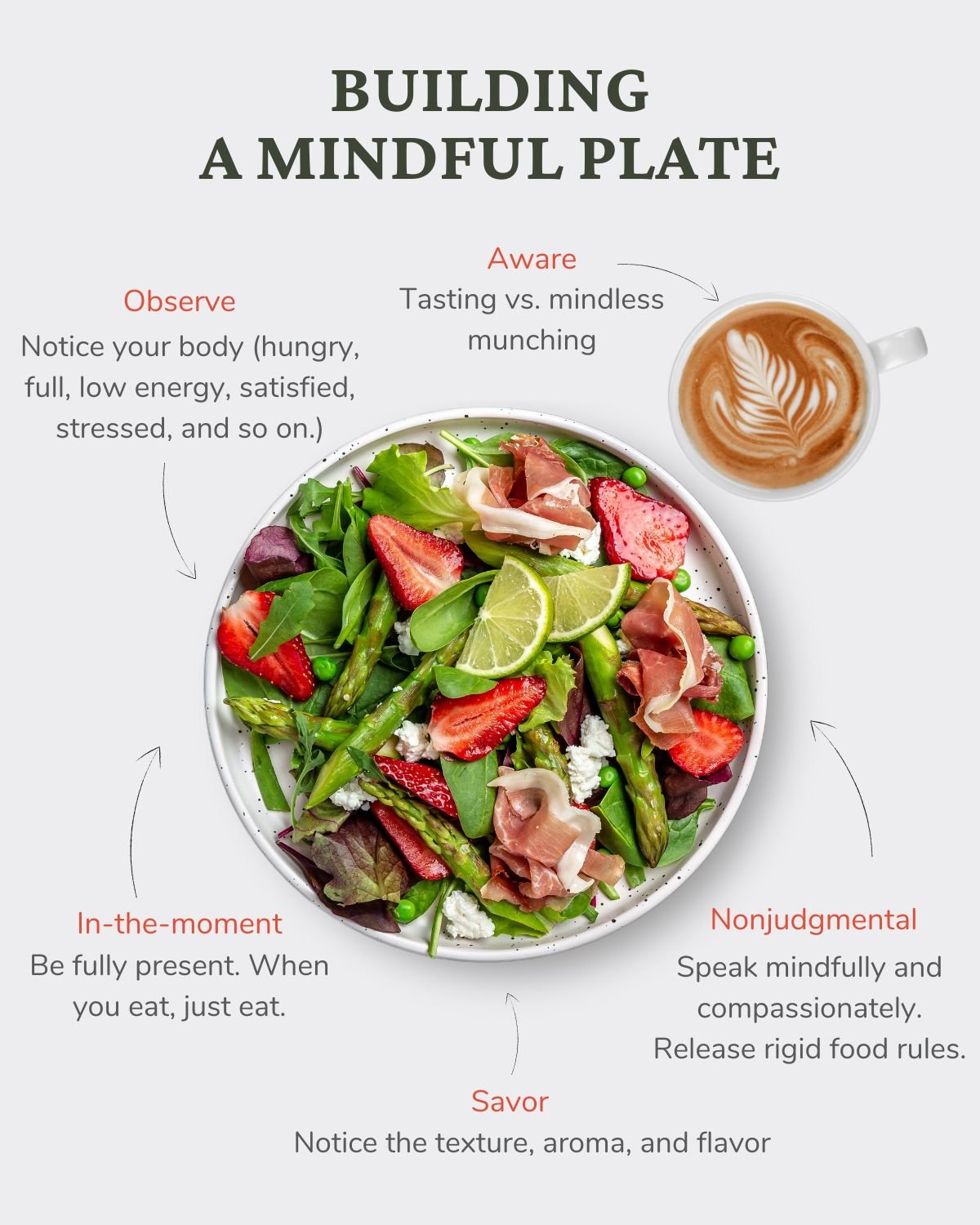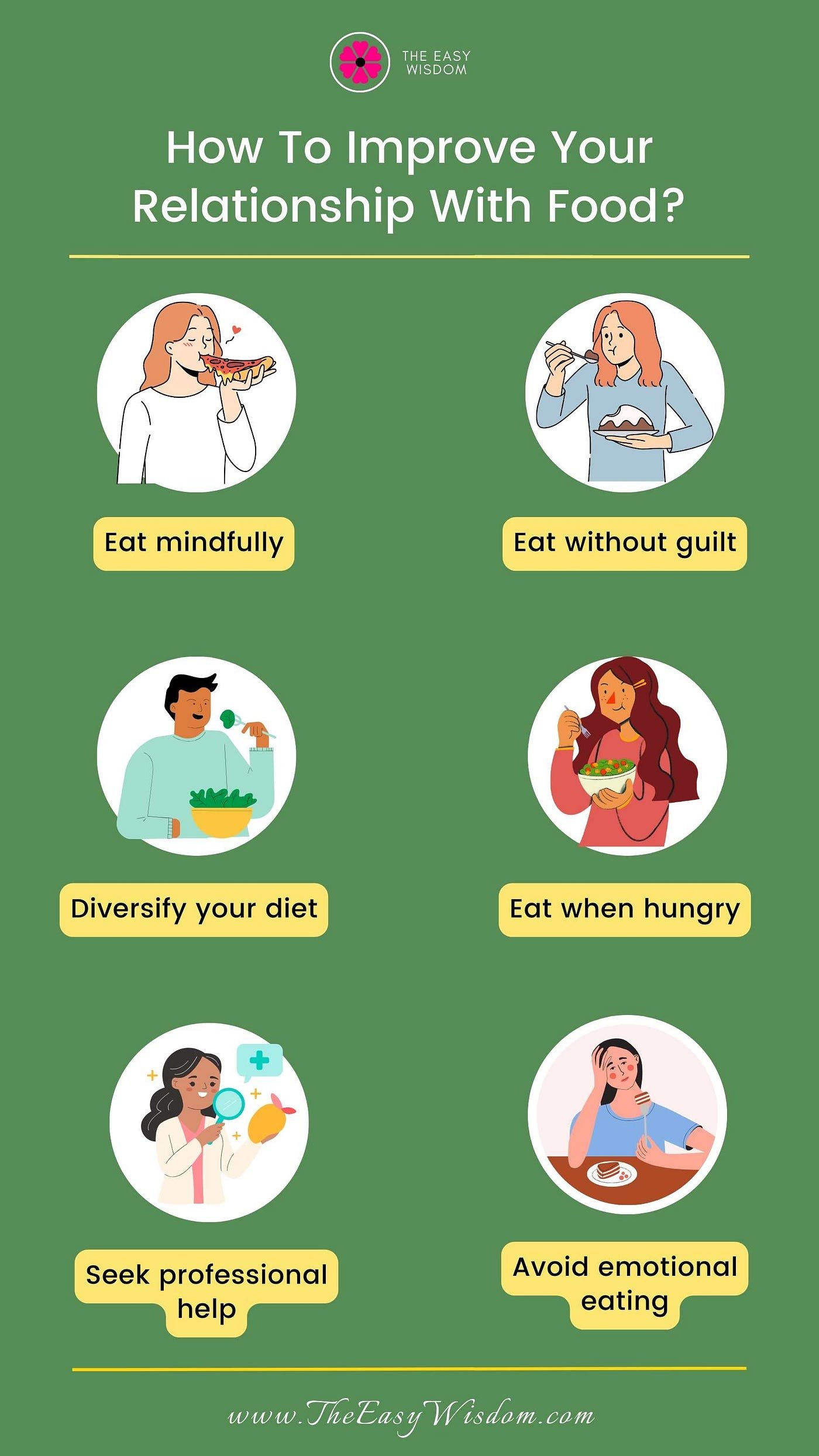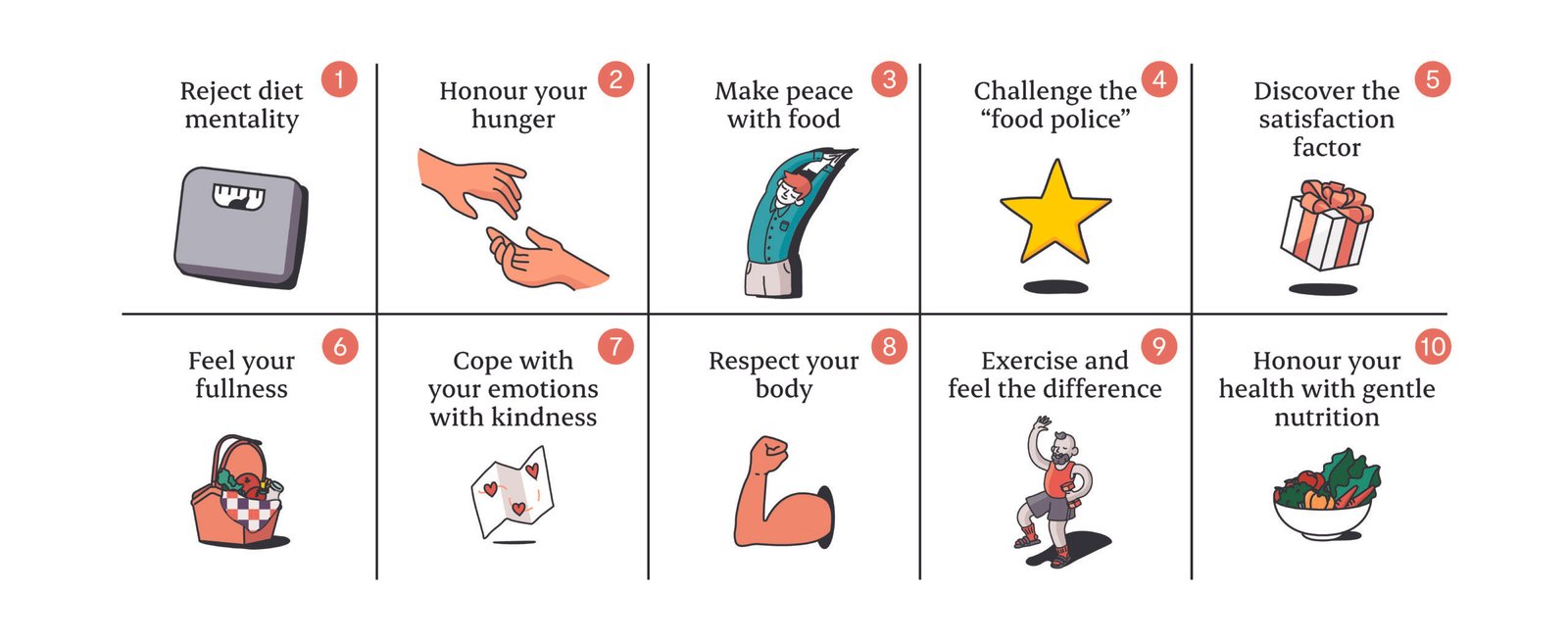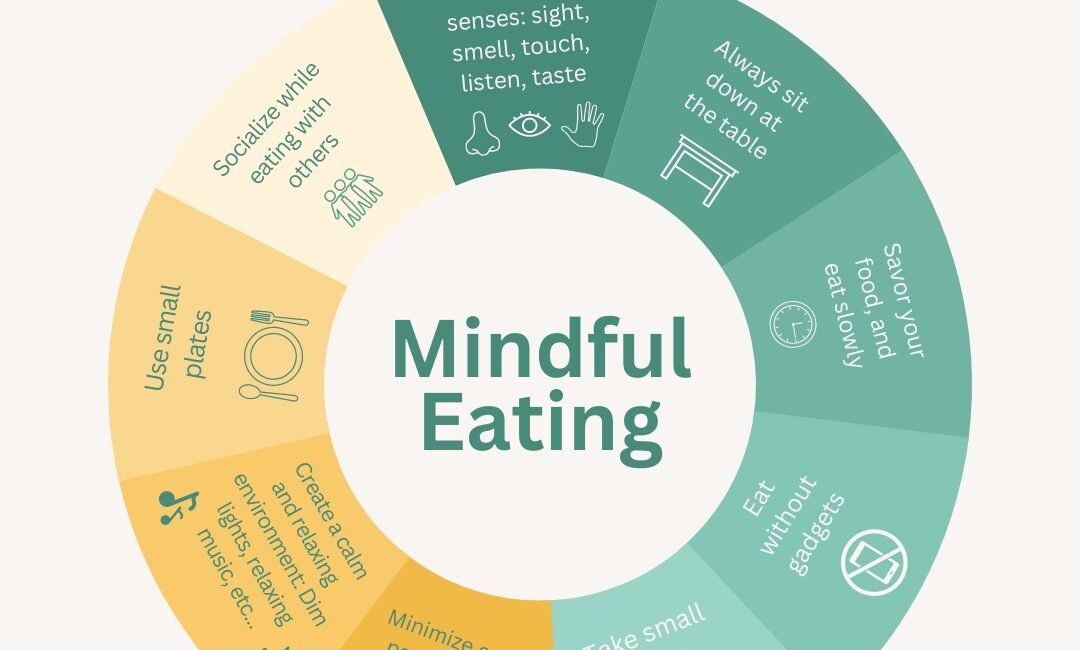Are you tired of mindlessly devouring your meals, feeling disconnected from what you’re putting into your body? In today’s fast-paced world, it’s all too easy to rush through meals or turn to food as a source of comfort rather than nourishment. But what if there was a way to cultivate a healthier, more mindful relationship with food? Look no further. In this article, you’ll discover 10 simple yet powerful strategies that can help you become more present while eating, allowing you to savor each bite and develop a more positive and balanced relationship with the food you consume. Get ready to embark on a journey of self-discovery and transform your eating habits for the better.

Pay attention to your body’s hunger and fullness cues
Eat when you’re physically hungry
One of the key aspects of mindful eating is to pay close attention to your body’s hunger cues. Before reaching for a snack or sitting down for a meal, take a moment to assess your physical hunger. Are you truly hungry, or are you eating out of habit, boredom, or emotional reasons? It’s important to eat when your body truly needs nourishment rather than eating simply for the sake of eating.
Stop eating when you’re comfortably full
Just as it’s important to eat when you’re physically hungry, it’s equally important to stop eating when you’re comfortably full. It can be easy to overeat and ignore the signals that your body is giving you. By learning to recognize the moment when you’ve had enough, you can avoid discomfort and allow your body to digest your food properly. Pay attention to how your body feels and honor its cues when it’s time to stop eating.
Avoid eating out of stress, boredom, or emotions
Mindful eating involves being aware of the reasons behind your eating habits. Many times, we turn to food as a way to cope with stress, boredom, or emotional turmoil. By recognizing these triggers, you can choose alternative ways to deal with these emotions, such as going for a walk, practicing deep breathing, or engaging in a hobby. Learning to differentiate between physical hunger and emotional hunger is an essential step towards developing a healthy relationship with food.
Listen to your body’s hunger and fullness signals
Your body has powerful signals to indicate its hunger and fullness levels. Take the time to tune in and listen to what your body is telling you. Notice any physical sensations or changes in energy levels. By becoming more attuned to these signals, you can determine when it’s time to eat and when it’s time to stop. Trusting your body’s cues is an essential aspect of mindful eating.
Eat slowly and savor your food
Take time to chew your food properly
In our fast-paced world, it’s easy to rush through meals without fully chewing our food. However, by taking the time to chew each bite thoroughly, we can enhance our digestion and enjoyment of the meal. Chewing breaks down the food into smaller particles, making it easier for our bodies to absorb the nutrients. Additionally, it allows us to fully experience the taste and texture of the food.
Put your utensils down between bites
To further encourage mindful eating, try putting your utensils down between bites. This simple act helps to slow down your eating pace and allows you to focus on fully experiencing each bite. Instead of rushing to take the next bite, take a moment to savor the flavors and textures in your mouth. This mindful eating practice can lead to increased satisfaction and a greater appreciation for your food.
Focus on the flavors, textures, and smells of your food
Food is a sensory experience, and by paying attention to the flavors, textures, and smells of your food, you can enhance your enjoyment of the meal. Take the time to truly savor the tastes on your palate, notice the different textures in each bite, and appreciate the aroma of the food. This level of awareness can help you connect with your food on a deeper level and promote a more fulfilling eating experience.
Appreciate each bite and the nourishment it provides
Every bite of food you take is an opportunity to nourish your body and provide it with the energy it needs. By appreciating the nourishment each bite offers, you can cultivate a greater sense of gratitude for the food you eat. Take a moment to reflect on where the food came from, the effort involved in its production, and the journey it took to reach your plate. This perspective can help you approach your meals with a sense of gratitude and respect.

Eliminate distractions
Turn off the TV, put away your phone, and close your laptop
In today’s digitally connected world, it’s common to eat while distracted by screens. However, this habit can lead to mindless eating and a disconnection from the present moment. To practice mindful eating, it’s essential to eliminate distractions. Turn off the TV, put away your phone, and close your laptop before sitting down to a meal. By giving your full attention to your food, you can savor each bite and engage your senses in the act of eating.
Create a calm and quiet eating environment
Another way to promote mindful eating is to create a calm and quiet eating environment. Find a space where you can enjoy your meal without interruptions or loud noises. This peaceful setting allows you to focus solely on your food and the experience of eating. By creating an environment that supports mindful eating, you can enhance your awareness and enjoyment of the meal.
Focus solely on the act of eating
When you sit down to eat, make a conscious effort to bring your attention solely to the act of eating. Avoid multitasking or trying to squeeze in meals during other activities. By giving your full attention to your food, you can truly engage with the process of eating and be present in the moment. This level of mindfulness can heighten your sensory experience and deepen your connection with your food.
Engage your senses in the present moment
As you eat, engage all your senses in the present moment. Notice the colors, shapes, and textures of your food. Take in the aroma and scent of your meal. Listen to the sounds your food makes while cooking or chewing. Fully experience the taste and flavors as they unfold in your mouth. By using all of your senses, you can fully immerse yourself in the experience of eating and cultivate a greater appreciation for your food.
Practice mindful portion control
Use smaller plates and bowls to control portion sizes
Portion control is an important aspect of mindful eating. Using smaller plates and bowls can help you manage your portion sizes and prevent overeating. Our brains tend to perceive a plate as being full, regardless of whether it’s large or small. By using smaller plates, you can trick your brain into feeling satisfied with a smaller serving. This simple technique can be a powerful tool in promoting mindful portion control.
Serve yourself a reasonable amount of food
When serving yourself a meal or snack, be mindful of the portion size. Pay attention to what your body truly needs and avoid overloading your plate. While it’s important to nourish your body adequately, it’s equally important to avoid excessive portions that can lead to discomfort or weight gain. Take the time to assess your hunger level and serve yourself a reasonable amount of food that aligns with your needs.
Avoid eating directly from the package or container
Eating directly from a package or container can make it difficult to gauge proper portion sizes. Instead, portion out your food onto a plate or in a bowl before you begin eating. This practice not only helps with portion control but also encourages mindful eating by allowing you to fully focus on your food without the distractions of the packaging. By eating from a designated portion, you can ensure that you’re consuming an appropriate amount.
Be mindful of portion sizes when eating out
Eating out can pose challenges when it comes to portion control. Restaurants often serve larger portions than what is necessary for a single meal. To practice mindful eating when dining out, consider sharing a dish with a friend or saving half of your meal for later. Pay attention to your body’s hunger and fullness cues, and don’t feel obligated to finish everything on your plate. By being mindful of portion sizes, you can enjoy eating out while still prioritizing your health.

Engage all your senses
Observe the colors, shapes, and textures of your food
When sitting down to a meal, take a moment to observe the colors, shapes, and textures of your food. Notice the vibrant hues of fruits and vegetables, the intricate patterns on a piece of sushi, or the smoothness of a creamy soup. By appreciating the visual aspects of your food, you can engage your senses and develop a stronger connection with what you’re about to eat.
Take in the aroma and scent of your meal
The aroma and scent of food play a significant role in our eating experience. As you sit down to eat, take a moment to breathe in and appreciate the smells coming from your plate. The scent of freshly baked bread, a steaming cup of coffee, or a fragrant bowl of curry can evoke memories and arouse your appetite. By fully experiencing the aromas, you can enhance your sensory enjoyment and anticipation of the meal.
Listen to the sounds your food makes while cooking or chewing
Pay attention to the sounds your food makes as you prepare it and as you chew it. The sizzle of a pan, the bubbling of soup, or the crunch of a crisp vegetable can add another layer of sensory awareness to your eating experience. By listening to these sounds, you can engage your sense of hearing and heighten your connection with your food.
Fully experience the taste and flavors
The most obvious sense involved in eating is taste, and mindful eating encourages us to fully experience the taste and flavors of our food. As you take each bite, consciously savor the different tastes that emerge. Notice the sweetness, saltiness, bitterness, sourness, or umami flavors that unfold in your mouth. By focusing on the taste, you can appreciate the intricacies of each ingredient and truly enjoy the flavors of your meal.
Cultivate gratitude for your food
Express gratitude before your meal
Before tucking into your meal, take a moment to express gratitude. Whether silently or out loud, acknowledge the food before you and appreciate the nourishment it provides. Express thanks for the farmers, the chefs, and all those involved in bringing the meal to your table. This simple act of gratitude can cultivate a positive mindset and set the tone for a mindful and enjoyable eating experience.
Acknowledge the efforts and processes involved in bringing the food to your table
Food doesn’t magically appear on our plates. Countless efforts and processes go into growing, harvesting, transporting, and preparing the ingredients we consume. Reflect on the journey your food took to reach your table and acknowledge the work and resources involved. By recognizing the efforts of others, you can develop a deeper sense of appreciation for your food.
Reflect on the nourishment and sustenance the food provides
Food is our fuel, providing us with the energy and nutrients we need to function and thrive. Take a moment to reflect on the nourishment and sustenance the food provides. Consider the vitamins, minerals, and other essential components that contribute to your well-being. By appreciating the nourishing properties of your food, you can cultivate a greater respect for the role it plays in supporting your health.
Practice gratitude towards your body’s ability to enjoy and digest food
Finally, practice gratitude towards your own body and its ability to enjoy and digest food. Our bodies are remarkable machines that allow us to experience the pleasure of food and extract vital nourishment from it. Rather than focusing on perceived flaws or insecurities, appreciate the functionalities and abilities of your body. By cultivating gratitude towards your body, you can develop a healthier and more positive relationship with food.

Identify emotional triggers and patterns
Recognize emotional eating patterns
Emotional eating is a common response to stress, sadness, and other emotions. Becoming aware of your emotional eating patterns can help you understand the underlying triggers and develop strategies to address them. Pay attention to the situations, events, or emotions that tend to lead you to mindlessly reach for food. By recognizing these patterns, you can learn to differentiate between emotional hunger and physical hunger.
Identify triggers that lead to mindless or unhealthy eating
Triggers play a significant role in our eating behaviors. They can be external factors such as the sight or smell of food, social situations, or specific environments. They can also be internal factors such as stress, boredom, or anxiety. Take the time to identify the triggers that lead to mindless or unhealthy eating for you personally. By recognizing these triggers, you can develop strategies to address them and replace them with healthier coping mechanisms.
Explore alternative ways to cope with emotions
It’s important to find alternative ways to cope with emotions other than turning to food. Explore activities and strategies that can help you manage stress, sadness, or other emotions effectively. This might include going for a walk, practicing deep breathing exercises, journaling, or talking to a trusted friend or family member. By finding alternative outlets for emotional expression and release, you can reduce reliance on food as a source of comfort.
Develop strategies to address emotional eating
Once you’ve identified your emotional eating patterns and triggers, develop strategies to address them. This might involve creating a list of alternative activities to engage in when emotions arise, finding healthy coping mechanisms, or seeking professional support from a registered dietitian or therapist. By proactively addressing emotional eating, you can develop healthier habits and a more balanced relationship with food.
Be mindful of your food choices
Consider the nutritional value of your food
When making food choices, consider the nutritional value of the options available to you. Aim to choose whole, unprocessed foods that provide a wide range of essential nutrients. Fill your plate with fruits, vegetables, lean proteins, whole grains, and healthy fats. By focusing on the nutrient density of your food choices, you can nourish your body and support your overall health and well-being.
Choose whole, unprocessed foods
Whole, unprocessed foods are the cornerstone of a healthy diet. They are minimally processed and retain their natural nutrients, fiber, and phytochemicals. Opt for fresh fruits and vegetables, lean proteins, whole grains, and natural sources of fats. By prioritizing these foods, you are making choices that align with your body’s nutritional needs and supporting your long-term health goals.
Mindfully include all food groups in your meals
Rather than following restrictive diets or cutting out entire food groups, aim to include a variety of foods from all food groups in your meals. Each food group offers unique nutrients and contributes to a well-balanced diet. Include ample servings of fruits, vegetables, whole grains, lean proteins, and healthy fats in your meals. By mindfully incorporating all food groups into your diet, you can ensure that your body receives a diverse array of nutrients.
Make conscious decisions about your food choices
Mindful eating involves making conscious decisions about your food choices. Before reaching for a snack or planning a meal, take a moment to consider the impact your choices will have on your body and overall well-being. Ask yourself if the food aligns with your nutritional goals, if it will provide sustained energy, and if it will genuinely satisfy your body’s needs. By bringing mindfulness to your food choices, you can make decisions that support your health and enhance your relationship with food.

Practice gratitude towards your body
Appreciate your body’s unique shape and size
Every body is unique, and it’s important to appreciate and embrace your own body’s shape and size. Avoid comparing yourself to others or societal ideals. Instead, focus on the journey towards self-acceptance and self-love. By appreciating your body as it is, you can cultivate a positive mindset that nourishes your relationship with food.
Focus on the abilities and functions of your body
Shift your focus away from solely aesthetic concerns and instead appreciate the abilities and functions of your body. Consider all the amazing things your body allows you to do, from walking and dancing to hugging loved ones and pursuing your passions. By acknowledging the capabilities of your body, you can develop a greater sense of gratitude for its strength and resilience.
Avoid engaging in negative self-talk or body shaming
Negative self-talk and body shaming are harmful behaviors that can damage your relationship with food and your body. Replace critical thoughts with positive affirmations and gentle encouragement. Treat yourself with kindness, compassion, and respect. By rejecting negative self-talk, you can create space for self-acceptance and a healthier mindset towards your body.
Treat your body with kindness and respect
Above all, remember to treat your body with kindness and respect. Nourish your body with wholesome foods, engage in regular physical activity that you enjoy, prioritize rest and relaxation, and practice self-care. By prioritizing your physical and mental well-being, you are showing love and appreciation for your body and fostering a positive relationship with food.
Seek support and professional help if needed
Reach out to a support system or loved ones
If you’re facing challenges in developing a healthy relationship with food, don’t hesitate to reach out to a support system or loved ones. Share your concerns and struggles with people you trust. Sometimes, having someone to listen, offer guidance, or simply provide a listening ear can make a significant difference in navigating your journey towards mindful eating.
Consider seeking guidance from a registered dietitian or therapist
If you find that your struggles with food and your relationship with eating are impacting your quality of life, consider seeking guidance from a registered dietitian or therapist who specializes in mindful eating or eating disorders. These professionals can provide personalized support and guidance tailored to your specific needs. They can help you explore psychological and emotional factors related to your relationship with food and guide you towards a healthier mindset and relationship with eating.
Join a mindful eating group or program
Joining a mindful eating group or program can provide you with a community of individuals who are also seeking to improve their relationship with food. These groups offer support, resources, and accountability as you navigate your mindful eating journey together. Participating in a program can provide valuable insights, strategies, and encouragement as you work towards developing a healthier and more mindful approach to eating.
Recognize when additional assistance may be beneficial
It’s important to recognize when additional professional assistance is needed. If you find that your struggles with mindful eating or food relationships are affecting your overall well-being, consider reaching out for further support. Mental health professionals and eating disorder specialists can provide the help and guidance necessary to address any underlying issues and support you in your journey towards a healthier relationship with food.
Incorporating these mindful eating strategies into your daily life can transform the way you relate to food. By paying attention to your body’s hunger and fullness cues, savoring your food, eliminating distractions, practicing mindful portion control, engaging all your senses, cultivating gratitude, identifying emotional triggers and patterns, being mindful of your food choices, appreciating your body, and seeking support when needed, you can develop a healthier and more balanced relationship with food. Remember, mindful eating is a journey, and each small step you take towards greater awareness and presence can have a profound impact on your overall well-being. Start today and embrace the transformative power of mindful eating.
